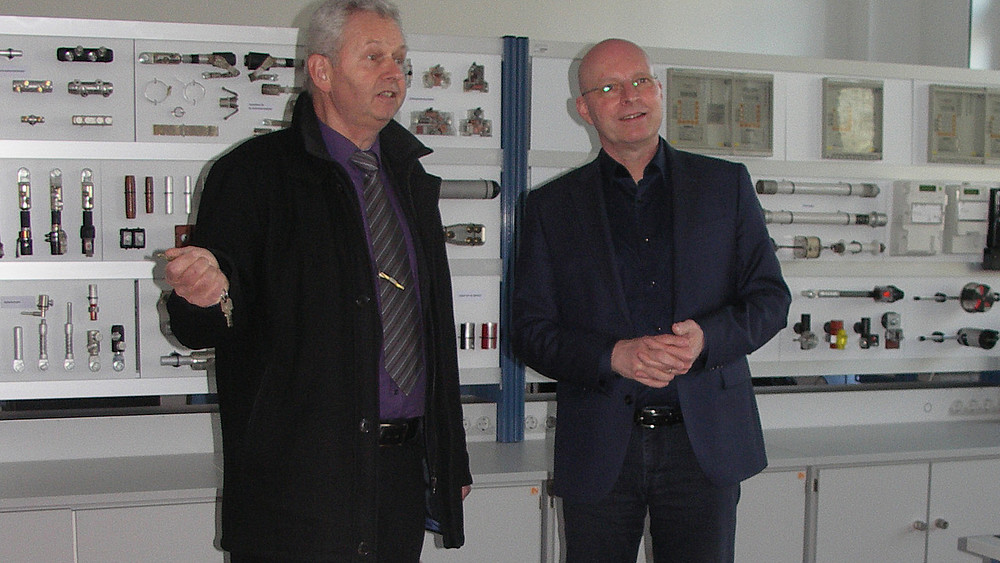Head of Department for Universities of Applied Sciences at the Saxon State Ministry of Science and the Arts came to Zittau.

On 27 February 2018, the new Head of the Department for Universities of Applied Sciences and Vocational Academies at the Saxon State Ministry of Science and the Arts, Dr. Bruno Bartscher, visited our university. He was keen to discuss specific topics with the Rectorate. In particular, the implementation of the Saxon University Development Plan 2025, the fulfillment of the 2017 to 2020 target agreement, construction development planning and the establishment of professorships were discussed.
Dr. Bartscher then visited the Faculty's new laboratories in Building Z I under the direction of the Dean of the Faculty of Electrical Engineering and Computer Science, Prof. Klaus-Dieter Haim, including the laboratory for protection and control technology/building control technology, DB control and safety technology, the smart grid laboratory, the EMC laboratory, the cable diagnostics laboratory and the new large laboratory hall for basic training in electrical engineering. Dr. Bartscher was impressed by the modern equipment.
After lunch together in the canteen with further discussions, the visit to the Zittau power plant laboratory was on the agenda. Dr. Clemens Schneider, project manager at the Institute for Process Engineering, Process Automation and Measurement Technology (IPM), gave a guided tour of the laboratory and explained the large-scale testing facilities installed there. Dr. Bartscher asked interested questions about the utilization of the research results and the practical application of findings from the research projects. For example: Where are phase change materials being used, where are magnetic bearings already being used and in which areas is there still a need for research, how can energy systems be made more flexible with thermal energy storage systems and how does this contribute to grid stabilization? The questions were answered in detail by employees Christian Vanek, Hagen Hoffmann and Clemens Schneider.
Dr. Bartscher also used his visit to talk to Prof. Sebastian Scholz, Professor of Functionally Integrating Polymer Technologies at the HSZG and also Head of the Technical Center of the Fraunhofer Plastics Center Oberlausitz. Prof. Scholz explained to Dr. Bartscher the equipment of the technical center, the opportunities it offers in terms of research and cooperation with companies in the region and the projects that are being worked on together with the Zittau/Görlitz University of Applied Sciences and the Fraunhofer IWU.
He then visited the "Production Engineering" and "Production Metrology" laboratories, which are representative of the Faculty of Mechanical Engineering. Dr. Bartscher followed the demonstration of the complex production and assembly line in the Production Engineering laboratory with great interest, and Martin Sturm was able to answer questions about student training in connection with this system. To illustrate the integration of all stages involved in the product creation process within the framework of Industry 4.0, the production process and production metrology laboratories were then visited. Various tactile and optical measuring systems were demonstrated, including the measurement of a complex part using an optical 3D scanner. An interesting discussion ensued about the possibilities of integrating the existing technologies into engineering training at Zittau/Görlitz University of Applied Sciences and their constantly growing relevance for the companies in which our graduates find their jobs after graduation.
The tour concluded with a visit to the laboratories for microbiology and bioprocess engineering at the Faculty of Natural and Environmental Sciences. Prof. Thomas Wiegert explained to Dr. Bartscher the biotechnological use of living systems using the example of various microorganisms. The path from the isolation and analysis of cells to targeted genetic modification, cultivation in laboratory fermenters and product isolation was demonstrated. As a lawyer with knowledge of forensic analysis methods, Dr. Bartscher was very interested in the molecular biological examination methods and equipment used in research and teaching in the university's biotechnology laboratories.